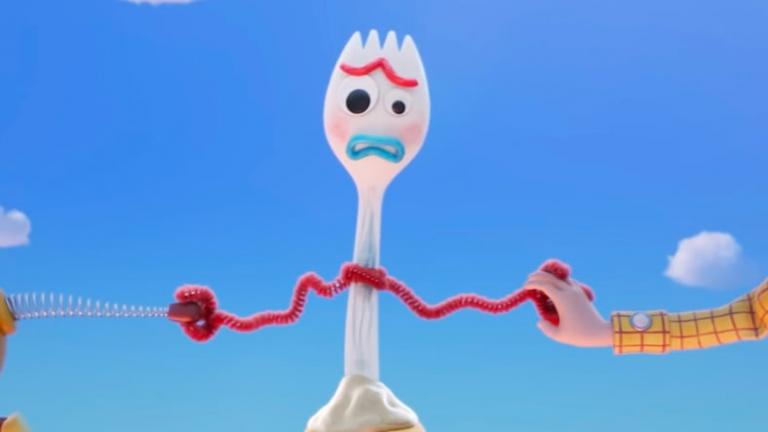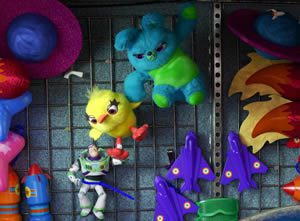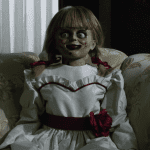
Toy Story 4 is an odd duck.

I’m not speaking of the literal odd duck in the movie that (with an equally odd blue rabbit) hangs out at a local carnival. No, the movie itself—in addition to being funny and bittersweet and thoughtful and everything we’ve come to expect from Pixar’s Toy Story franchise—is just … odd. While it’s not the strongest film in the Toy Story canon, that oddness makes it the most daring. That’s because the film hones its narrative guns on one of life’s most difficult and, inherently spiritual, questions: Why are we here?
In some sense, this has long been the overarching theme of all the Toy Story films. Why are we here? Toys ask themselves in every chapter. Answer: To love and be loved. To belong to someone. The message is both simple and profound. It affirms community and family and, I think, a very Christian sense of servanthood, but it doesn’t delve that deeply into the matter.
But Toy Story 4 doesn’t settle for that. No, really, it asks. WHY ARE WE HERE?! Why were we created? What if something went wrong? What happens if what should be our purpose doesn’t … work out?
If the other Toy Story movies offered, on some level, an actionable plan for life and purpose, Toy Story 4 dares to ask what happens if the plan goes wrong.
But to avoid drizzling out any spoilers, let’s turn our attention to the movie’s best new character—a little guy named Forky who’s having a very different sort of existential crisis. When he asks himself why he’s here, he’s not looking for everyday meaning. He’s looking at the meaning of cosmic design. Because that very design ruined his own plan.
A Spork in the Road
Forky was once just a bunch of unconnected bits of trash. Then, during kindergarten orientation, Bonnie takes these stray pieces of garbage—a spork, a pipe cleaner, a broken popsicle stick—puts them together and scrawls her name on the bottom of the thing’s popsicle-stick feet. And somehow in the process, a new, very confused creation becomes aware of the world around him.
For Christians, this could read as an echo of our own creation story pulled straight from Genesis. According to the story, we were made, literally, from dirt. And if we were essentially ground down to those earthy elements again, we might be worth a buck. But somehow, God took our raw ingredients and breathed life into them, making us into what He considers to be priceless sentient treasures.
Just like Forky, really. Immediately, the ugly little thing becomes Bonnie’s favorite toy—valued beyond measure.
But Forky doesn’t see himself that way. He still sees himself as, literally, trash. It makes for some of the funniest scenes in the movie’s opening act—Forky desperately trying to return to the garbage heap from whence he came. He’s the most adorable nihilist in cinematic history.
But he also reflects a deep uncertainty that, honestly, many of us feel—and increasingly so in our more scientific, cynical and often anxious era.

Studies suggest that many folks don’t quite know why they’re here—and aren’t very pleased that they are. Suicide rates among teens are the highest on record. Deaths from drugs and alcohol have hit an all-time high, as well. HBO’s new and wildly problematic Euphoria, for all its issues, addresses the age’s bleak sensibilities. People are “reaching for something meaningful,” narrator Rue says. Her own personal high seems to be akin to oblivion: She remembers when she stopped breathing, and the comforting feeling of nothingness wrapped her in its numb embrace.
“I never asked to be born,” a young adult recently told me. In that moment, his whole existence felt maybe a lot like Forky’s at first: He was on the planet without his permission, and in a world he didn’t really understand. Forky spoke of the trash being warm and comfortable. A life of sentient toydom holds little appeal for him. Some know just how he feels.
But Woody tells him that sense of warmth and comfort is the very same thing that Bonnie feels when she takes Forky up in her tiny arms. And suddenly, Forky understands.
The Toy Story franchise has always been about love and sacrifice, and so it returns again to that theme. We never get the sense that Forky forgets the curious joys of being trash. But he realizes now that he was made for a greater purpose. To love, and be loved by, his creator. He comes to understand that there’s an inherent beauty and joy in accepting that love, and to love others in return. You only need to take a Forky-sized step to bring that into a beautiful spiritual message: Sure, life can be difficult and confusing. Sometimes we can feel like the trash. But to be loved by our Creator? And to love Him—and others—in return? We find meaning in the mess.
As noted, Toy Story 4 takes us beyond Forky’s understanding of the meaning of life. Lots of toys are dealing with existential crises here, especially Woody. After being the top of the toy totem pole when he was Andy’s favorite plaything, Woody finds that he’s more and more an afterthought in the life of his new child, Bonnie.
And as he grapples with his issues, we adults hear echoes of our own. I just got let go from my dream job; what next? My kids are grown. What do I do now? Very early on in our own lives, we dream big and plan for who and where we’ll be. But our lives take detours. Sometimes we get lost. Honestly, I think dealing with disappointment is a huge part of adulthood, and Woody’s dealing with lots of it here.
But that gets us into spoilers. And Woody’s journey here deserves its own post.













